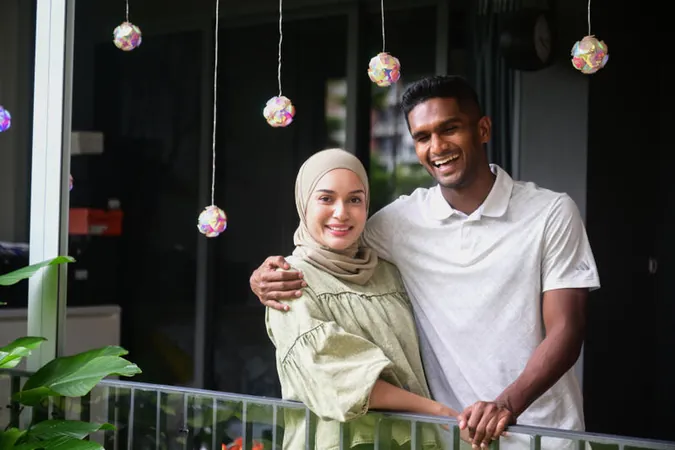
Empathy for All: A Call to Make the World Kinder for Children with Autism
2025-03-30
Author: Wei
In a heartwarming incident unfolding at a condominium pool in Singapore, eleven-year-old Naufal was having fun splashing around with his younger sister, nine-year-old Nadine. In a playful moment, Naufal mimicked the iconic Merlion, playfully splattering water. However, things took a turn when a stranger confronted him, chastising him for his behavior. Naufal's reaction—splashing water back—sparked confusion and frustration.
Nadine, quick to defend her brother, attempted to explain Naufal's autism to the woman standing nearby. Unfortunately, her efforts were met with dismissal: “It doesn’t matter, he shouldn’t be doing that.” Devastated, Nadine returned home in tears and shared the upsetting encounter with their father, renowned national football captain Hariss Harun.
In a subsequent Instagram video, Hariss expressed his distress over the incident, urging the broader community to foster a culture of understanding and empathy for individuals with autism. He noted that, despite their efforts to teach Naufal appropriate social behavior, challenges remain and parents of children with special needs face unique struggles. His poignant message resonated: "My son deserves to be out there. This world is equally his as it is ours."
Challenges of Parenting Special Needs Children
The experience shared by Hariss is a reflection of the fears many parents of children with autism confront daily. Chris Lim, a father with two children on the autism spectrum, recounted a distressing incident involving his twelve-year-old son, Gabriel, during a school holiday. While at a mall with friends, Gabriel's innocent play with a ball inadvertently triggered store alarms, causing panic and chaos. "As a parent of a child with special needs, these moments can be terrifying," shared the 43-year-old art director.
Social challenges are part of a continual journey of learning and adapting, a theme echoed by both Hariss and Lim. Hariss and his wife, Syahirah, face ongoing adjustments as Naufal prepares to navigate puberty, presenting additional complexities in managing sensory sensitivities. “It is essential to constantly find new approaches that cater to his needs," Hariss remarked, highlighting the evolving nature of parenting children with autism.
The Lim family’s journey also included extensive preparation designed to foster independence. They gradually exposed their sons to everyday tasks, such as grocery shopping and utilizing public transportation, employing repetitive practice and reminders. With time, they began to allow their older son, Clarence, to explore the world independently, fostering confidence and capability in both boys.
Acceptance and Awareness
Hariss and Syahirah's journey has evolved beyond denial toward a profound acceptance of Naufal's differences. Syahirah's Instagram bio now boldly states, "I love someone with autism," as she actively engages with other parents seeking guidance and support. "Many are initially in denial and look for reassurance," she noted—a sentiment that resonates with Mr. Lim, who also encountered his struggle with acceptance early on.
As a supporter of CaringSG, a non-profit for caregivers of individuals with special needs, Mr. Lim now understands the importance of self-care in the caregiving journey. He emphasizes that this path is more of a marathon than a sprint, reminding himself and others to pace themselves amid the challenges.
Toward a More Inclusive Society
Stories of prejudice and misunderstanding persist, reminding us of the urgent need for societal change. Syahirah recounted an incident where Naufal innocently touched a neighbor’s bicycle, only to be reprimanded harshly by the girl’s father, who refused to acknowledge Naufal's special needs. In a similar vein, Denise Phua, Mayor of Central Singapore District and advocate for individuals with autism, reflected on her own experiences raising an autistic son, underscoring the emotional scars that such incidents leave.
Phua envisions a community that celebrates diversity and fosters respect, urging society to engage with those who are neurodiverse and learn from their experiences. "Before judging a child's behavior, consider the deeper context. Show empathy and interest in understanding their unique needs," she admonished.
Hariss concluded by affirming the necessity for compassion: “We all must strive to create a more inclusive society where everyone feels valued and understood. Whether through family, friends, or community efforts, we can foster a network of support for those with special needs.”
As we navigate complex social dynamics, stories like Naufal's remind us that empathy for all children, regardless of their differences, is the first step towards building a better world for everyone.



 Brasil (PT)
Brasil (PT)
 Canada (EN)
Canada (EN)
 Chile (ES)
Chile (ES)
 Česko (CS)
Česko (CS)
 대한민국 (KO)
대한민국 (KO)
 España (ES)
España (ES)
 France (FR)
France (FR)
 Hong Kong (EN)
Hong Kong (EN)
 Italia (IT)
Italia (IT)
 日本 (JA)
日本 (JA)
 Magyarország (HU)
Magyarország (HU)
 Norge (NO)
Norge (NO)
 Polska (PL)
Polska (PL)
 Schweiz (DE)
Schweiz (DE)
 Singapore (EN)
Singapore (EN)
 Sverige (SV)
Sverige (SV)
 Suomi (FI)
Suomi (FI)
 Türkiye (TR)
Türkiye (TR)
 الإمارات العربية المتحدة (AR)
الإمارات العربية المتحدة (AR)